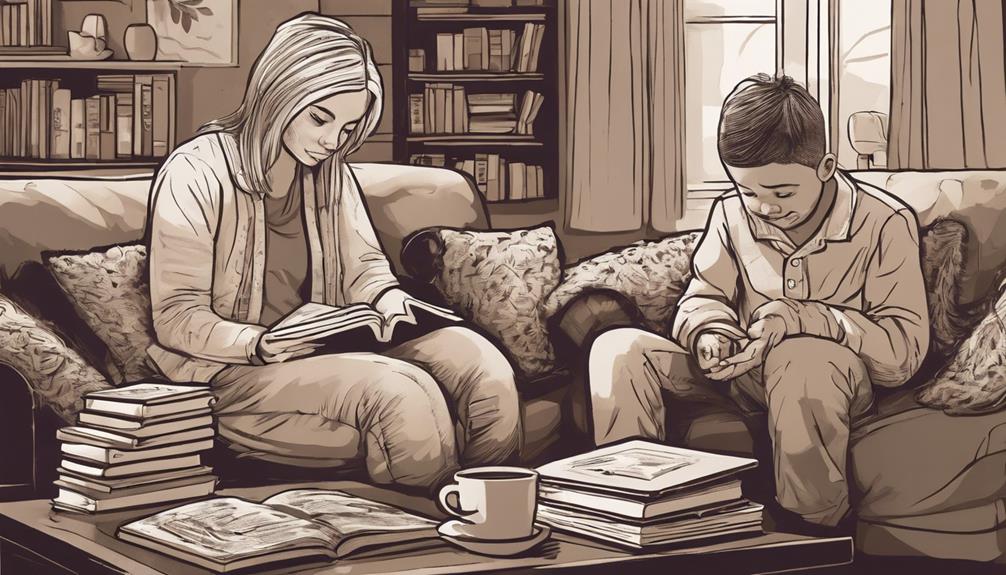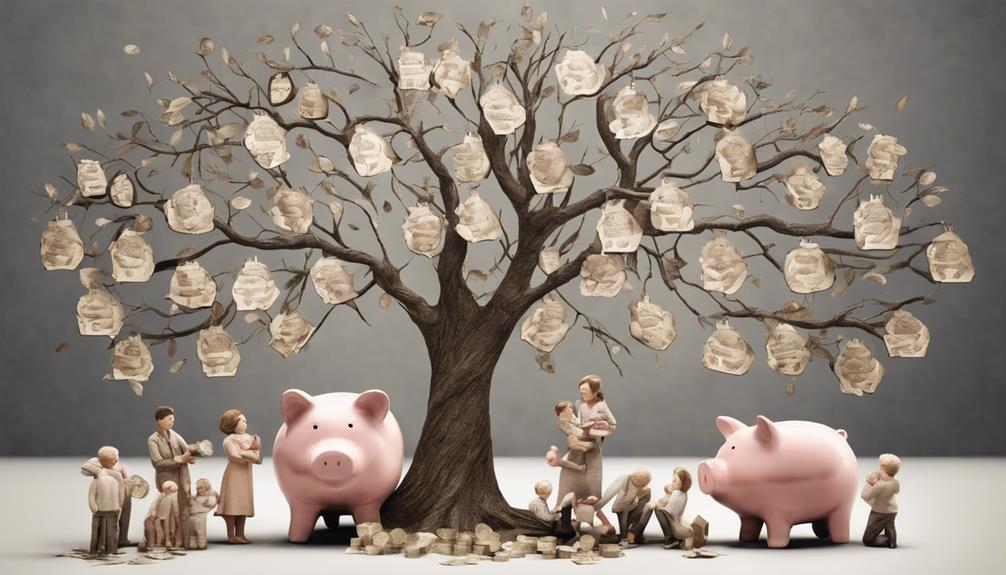As we navigate the difficult process of separating and divorcing, it’s common to seek guidance and understanding during the emotional turmoil.
The journey can seem daunting, but with the right tools and support, it becomes manageable.
In this discussion, we'll explore practical steps and valuable insights that can help ease the transition into this new chapter of life.
Let's uncover strategies that promote healing, growth, and resilience in the face of such significant life changes.
Key Takeaways
- Acknowledge and accept emotions to begin healing
- Provide stable environment and open communication for children
- Redefine roles and routines for a new family dynamic
- Prioritize self-care and seek legal guidance for effective planning
Emotional Coping Strategies
To effectively navigate the emotional challenges of separation and divorce, it's crucial to acknowledge and accept our emotions. Separation and divorce can bring a whirlwind of emotions, from grief and loss to anger and confusion. Coping strategies play a vital role in helping us process these feelings. Seeking support from friends, family, or a therapist can provide a safe space to express and unravel these complex emotions. Engaging in self-care activities such as exercise, meditation, or hobbies can also promote emotional well-being during this turbulent time.
Acceptance is key in the healing process. It's important to practice self-compassion and allow yourself the necessary time to heal and adjust to the changes that come with separation and divorce. Remember, it's normal to experience a range of emotions, and seeking therapy can be a valuable tool in coping with the emotional impact of this transition. By acknowledging our emotions, seeking support, practicing self-care, and allowing ourselves time to heal, we can gradually navigate the path towards emotional well-being and adjustment.
Supporting Children Through Divorce

Navigating through the emotional challenges of separation and divorce can be especially tough on children, who may experience confusion, anger, and sadness during this difficult time. As parents, it's crucial to provide stability and open communication to help children adjust positively to the changes.
While offering emotional support is essential, it's important not to burden children with needs beyond their capacity to handle.
Patience is key as children come to terms with the separation, and acceptance may take time. If concerns arise about a child's well-being, seeking professional help is recommended to ensure they've the necessary support.
Adjusting to New Roles
Adjusting to new roles post-separation involves actively redefining responsibilities and routines within the family dynamic. It's essential to understand that as time progresses, the family structure may shift, requiring flexibility and open communication. Cooperation among all family members is crucial in navigating these changes smoothly. Setting clear boundaries and respecting each other's needs can help maintain healthy relationships during this transition. Seeking support and guidance from a therapist, counselor, or support group can provide valuable insights and coping strategies when adjusting to these new roles.
Responsibilities may need to be reallocated, and routines might require adjustments to accommodate the changes. Embracing these modifications with an open mind and a willingness to adapt can foster a sense of unity within the family. Remember, roles within the family aren't set in stone and may evolve over time. By working together and being patient with one another, the family can create a new dynamic that supports everyone's well-being.
Self-Care Tips

As we adapt to new roles following separation and divorce, prioritizing self-care becomes essential for maintaining our well-being and resilience.
Here are some practical self-care tips to help you navigate this challenging time:
- Engage in Regular Exercise: Incorporating physical activity into your routine can reduce stress levels, enhance your mood, and improve your overall well-being. Whether it's a brisk walk, a yoga session, or a dance class, moving your body can have significant benefits for your mental and physical health.
- Practice Mindfulness Techniques: Explore mindfulness practices such as meditation or deep breathing exercises to calm your mind, increase emotional resilience, and promote inner peace. These techniques can help you manage the emotional turmoil that often accompanies separation and divorce.
- Prioritize Sufficient Sleep: Ensure you get enough restful sleep each night to support your mental and physical health. Adequate sleep is crucial for managing stress, processing emotions, and staying resilient during this turbulent period in your life.
Legal Guidance and Support
Seeking legal guidance and support during separation and divorce is crucial for protecting your rights and understanding the complexities of legal proceedings. A family lawyer can provide valuable assistance in navigating divorce proceedings, property division, and child custody arrangements.
By seeking legal advice early on, you can avoid costly mistakes and streamline the process, ensuring a smoother transition. Legal support is essential for clarifying legal terms, understanding your rights and responsibilities, and grasping the legal implications of your decisions during separation and divorce.
Having a clear understanding of the legal aspects involved can help you make informed choices and effectively plan for the future. Remember, you don't have to go through this alone; a knowledgeable family lawyer can support you every step of the way, providing the guidance you need to protect your interests and move forward confidently.
Frequently Asked Questions
How Do You Cope With Being Separated?
We cope with being separated by seeking support from loved ones, practicing self-care activities, communicating openly with our ex-partner, considering therapy, and focusing on personal growth. These steps help us navigate the emotional challenges of separation with resilience.
What Is the First Thing to Do When Separating?
First thing to do when separating? Seek legal guidance to understand rights and obligations. Create a separation agreement for clarity on custody and finances. Open communication with your partner. Prioritize emotional well-being with support. Organize important documents.
Why Is Separation so Painful?
Separation is so painful because it involves losing shared dreams, routines, and a sense of self. It causes emotional turmoil, stress, and uncertainty about the future. Healing from this requires time, self-care, and support.
What Not to Do During Marriage Separation?
During marriage separation, we should avoid impulsive decisions, involving children in conflicts, destructive behaviors, rushing into new relationships, and oversharing on social media. These actions can exacerbate the pain and hinder healing.
Conclusion
In navigating the tumultuous waters of separation and divorce, remember: we're all in this together. Like a ship in a storm, we must weather the waves of change with resilience and grace.
Let's hold onto hope as our anchor, knowing that brighter days lie ahead. Stay strong, seek support, and remember that healing is a journey we walk together.
You aren't alone in this journey towards healing and renewal.










